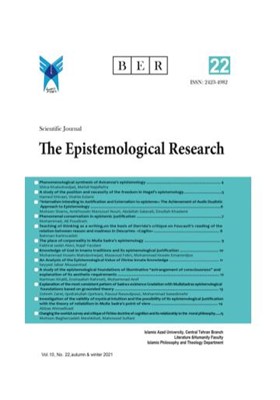Teaching of thinking as a writing, on the basis of Derrida’s critique on Foucault’s reading of the relation between reason and madness in Descartes' "Cogito"
Subject Areas : Epistemological researches
1 - Educational Sciences, literature and human science, Islamic Azad University, Iran, Saravan
Keywords: Derrida, madness, "Teaching thinking, Writing. Reason,
Abstract :
The concept of thinking is one of the important issues in epistemology that philosophers and epistemologists have expressed different views on the nature of thinking and how relates to the reason. In this paper, we reconstruct the concept of thinking from Derrida's point of view through his critique on Foucault's reading of Descartes' "Cogito" and how relates to education. According to Foucault, Descartes excludes madness from thought, while Derrida believes that in Cogito, madness is only one case of thought (within thought). In Derrida's reading, Cogito is a zero point in which reason and madness are intertwined. While Foucault interprets Descartes as saying; I think, therefore I'm not mad, Derrida understands him as saying; Whether I am mad or not, Cogito, sum. Derrida, on the other hand, acknowledges that thinking is a kind of writing. Thinking; or the writing itself is possible only due to the absences and impossible situations, and rationality is possible only due to the irrationality, that is, madness. Derrida's writing is also made possible by a double connection with the teacher, Foucault's teaching; the teacher first of all, educates the students by providing the appropriate knowledge and way of thinking, and then the students challenge the teacher to think for themselves and create their unique voice.
دریدا، ژاک (1399). کوگیتو و تاریخ جنون، ترجمه مریم ولیانی، تهران: نشر هرمس
پارسا، مهدی (1393). دریدا و فلسفه، تهران: نشر علمی
کریم زاده، بهمن، یاری دهنوی، مراد، باقری، خسرو، علوی، حمیدرضا (1398). فلسفه نوشتار از دیدگاه دریدا و پیامدهای آن در تعلیم و تربیت، مبانی تربیت، 9(1)، 130- 149.
Derrida, J. (1976). Of Grammatology. (G .Ch. Spivak, Trans), Baltimore: John Hopkins University Press.
--- (1981). Positions (A. Bass, Trans.). Chicago: The University of Chicago Press.
--- (1984). Margins of philosophy (A. Bass, Trans.). Chicago: The University of Chicago Press.
--- (1994). The history of madness in the age of psychoanalysis. Critical Inquiry, 20, 227–266.
--- (2006). Writing and difference (A. Bass, Trans.). London: Routledge.
Descartes, R. (1996). Meditations on first philosophy (J. Cottingham, Trans.). Cambridge: Cambridge University Press.
Foucault, M. (2006a). History of madness (J. Murphy & J. Khalfa, Trans.). London: Routledge.
--- (2006b). My body, this paper, this fire. In History of madness (J. Murphy & J. Khalfa, Trans., pp. 550–574). London: Routledge.
Sanir, I (2020). Education and Thinking in Continental Philosophy, Contemporary Philosophies and Theories in Education, 17, 114-145
Trifonas, P. (2000). The Ethics of Writing: Derrida, Deconstruction and Pedagogy, Lanham: Rowman and Littlefield Publishers.
Williams, E. (2016). The ways we think: From the stairs of reason to the possibilities of thought. Hoboken: Wiley-Blackwell.
_||_

